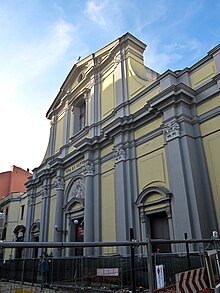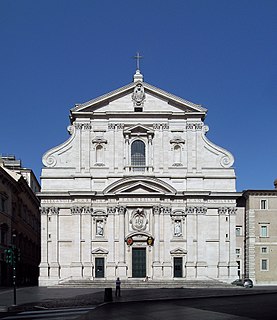
The Church of the Gesù is the mother church of the Society of Jesus (Jesuits), a Catholic religious order. Officially named Chiesa del Santissimo Nome di Gesù all'Argentina, its facade is "the first truly baroque façade", introducing the baroque style into architecture. The church served as model for innumerable Jesuit churches all over the world, especially in the Americas. Its paintings in the nave, crossing, and side chapels became models for Jesuit churches throughout Italy and Europe, as well as those of other orders. The Church of the Gesù is located in the Piazza del Gesù in Rome.

San Francesco a Ripa is a church in Rome, Italy. It is dedicated to Francis of Assisi who once stayed at the adjacent convent. The term Ripa refers to the nearby riverbank of the Tiber.
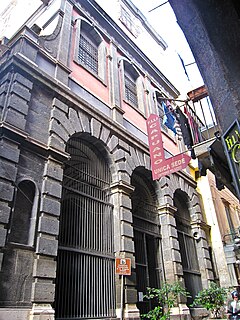
San Gregorio Armeno is a church and a monastery in Naples, Italy. It is one of the most important Baroque complexes in Naples. The church is located on a street of the same name just south of Via dei Tribunali and a few blocks south of the church of San Paolo Maggiore, Naples

Gesù Nuovo is the name of a church and a square in Naples, Italy. They are located just outside the western boundary of the historic center of the city. To the southeast of the spire, one can see a block away the Fountain of Monteoliveto and the piazza of the church of Sant'Anna dei Lombardi. The square is a result of the expansion of the city to the west beginning in the early 16th century under the rule of Spanish viceroy Pedro Alvarez de Toledo. The square of Gesù Nuovo contains three prominent landmarks:

The Church and Convent of the Girolamini or Gerolamini is a church and ecclesiastical complex in Naples, Italy. It is located directly across from the Cathedral of Naples on via Duomo. The facade is across the homonymous piazza and street from Santa Maria della Colonna. It is one block west of Via Duomo.

Santa Maria la Nova is a Renaissance style, now-deconsecrated, Roman Catholic church and monastery in central Naples. The church is located at the beginning of a side street directly across from the east side of the main post office, a few blocks south of the Church and Monastery of Santa Chiara. Today the adjacent monastery is a meeting site and hosts the Museo ARCA of modern religious art.

Sant'Anna dei Lombardi,, and also known as Santa Maria di Monte Oliveto, is an ancient church and convent located in piazza Monteoliveto in central Naples, Italy. Across Monteoliveto street from the Fountain in the square is the Renaissance palace of Orsini di Gravina.
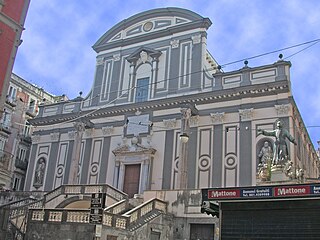
San Paolo Maggiore is a basilica church in Naples, southern Italy, and the burial place of Gaetano Thiene, known as Saint Cajetan, founder of the Order of Clerics Regular. It is located on Piazza Gaetano, about 1-2 blocks north of Via dei Tribunali.
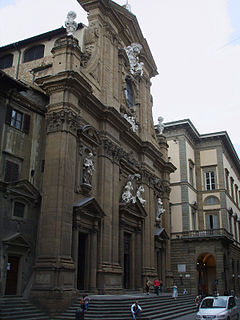
San Gaetano, also known as Santi Michele e Gaetano, is a Baroque church in Florence, Italy, located on the Piazza Antinori.
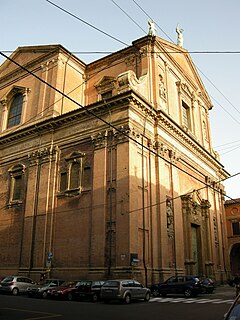
Santissimo Salvatore is a Baroque-style Roman Catholic church in central Bologna, Italy.

Volterra Cathedral is a Roman Catholic cathedral in Volterra, Italy, dedicated to the Assumption of the Virgin Mary. It is the seat of the bishop of Volterra.

The Ospedale degli Incurabili or Complesso degli Incurabili is an ancient and prominent hospital complex located on Via Maria Longo in central Naples, Italy. Part of the complex, including the remarkable pharmacy, are now the Museo delle arti sanitarie of Naples.
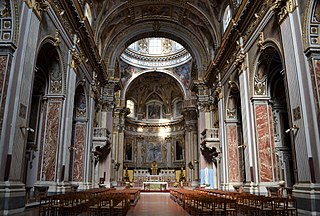
Santi Apostoli is a Baroque-style church in Naples, Italy.
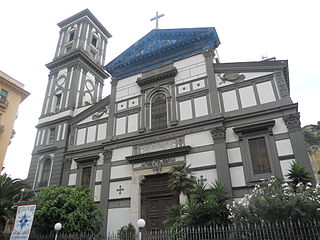
Santa Maria di Piedigrotta is a Baroque-style church in Naples, Italy; it is located in the neighborhood or quartiere of Piedigrotta.
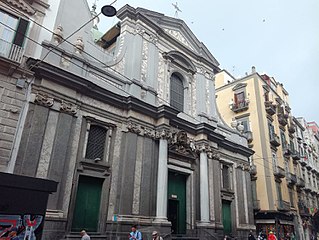
The church of St. Nicholas the Charitable is a church located on via Toledo, almost midway between Piazza Carità and Piazza Dante in Naples, Italy.

Santa Maria Regina Coeli is a Roman Catholic church in central Naples, Italy.

The church of the Croce di Lucca is a religious edifice in central Naples, Italy, on the Via dei Tribunali.

The Church of the Theatines (Teatini), also known as Santa Maria della Pietà is a Roman Catholic, Baroque-style church and monastery located on Corso della Giovecca, in central Ferrara, region of Emilia-Romagna, Italy.
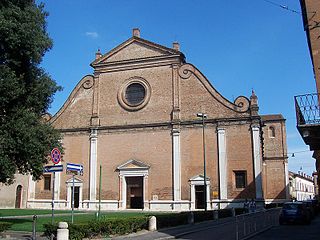
San Francesco is a late-Renaissance, Roman Catholic minor basilica church located on via Terranuova in Ferrara, region of Emilia-Romagna, Italy.
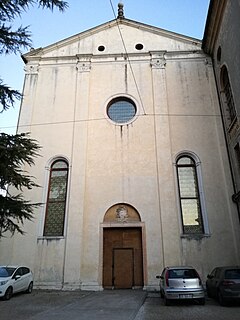
Santa Maria in Vanzo is a Renaissance-style, Roman Catholic church in Padua, region of Veneto, Italy.
